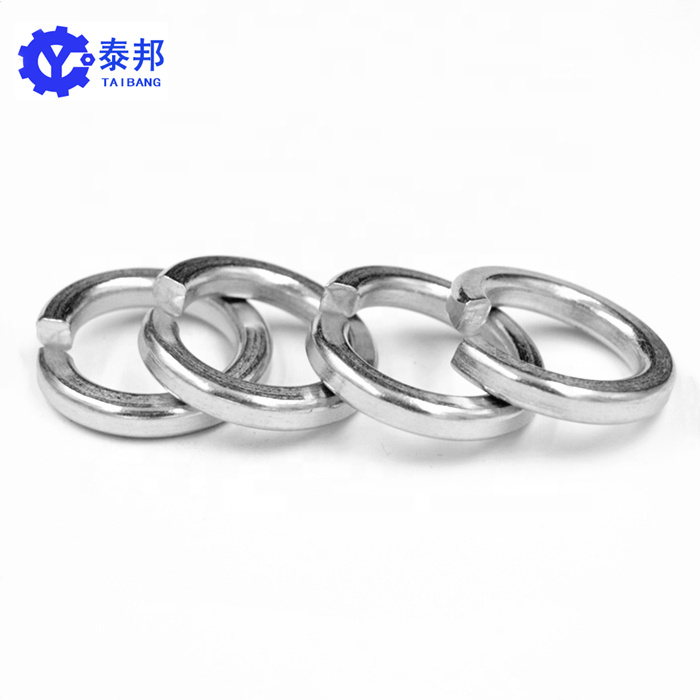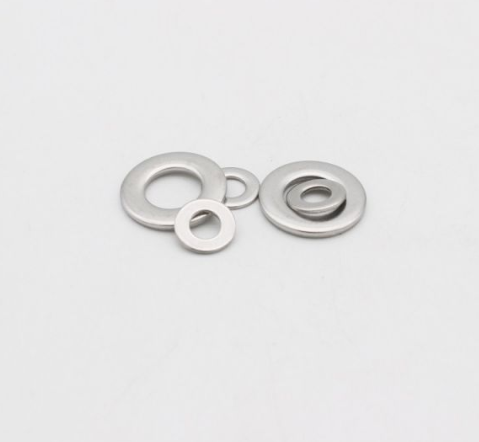Cause of fracture
1. the expansion of the spring washer is generally not the problem of the spring washer itself
2. the spring washer with expanding ring must be subject to a radial outward tension, which is derived from the tightening axial force generated by the tightening torque
3. the outer chamfer of the nut bearing surface produces a radial component of the axial clamping force, which makes the opening of the spring washer expand. The smaller the chamfer diameter, the greater the possibility of ring expansion
4. adding a flat washer between the nut and the spring washer can help to slow down or prevent the expansion of the ring, but the flat washer is too thin or too soft to prevent the expansion of the ring
5. the hydrogen embrittlement fracture of spring washer is generally caused by unreasonable heat treatment process and the failure to conduct hydrogen removal treatment in time after zinc plating
A large number of experiments and long-term practical experience have confirmed the above analysis.
Other categories
Internal tooth elastic washer, external tooth elastic washer
There are many sharp elastic warping teeth on the circumference, which stab and press on the bearing surface to prevent the loosening of fasteners. The internal tooth elastic washer is used under the screw head with small head size; External tooth elastic washers are mostly used under bolt heads and nuts. The elastic washer with teeth is smaller than the ordinary spring washer. The fastener is stressed evenly and reliable to prevent loosening, but it is not suitable for common disassembly.
Wave Spring Washers
National standard: GB/T 7246-1987
Corrugated washers are divided into WG, WL and wn types
WG corrugated washer
WG wave washer is an open elastic washer, which can usually be installed in a small space, such as applying prestress to the bearing, reducing the running noise of the bearing, and improving the running accuracy and stability of the bearing In addition, there are a large number of Applied Materials in electronic and electrical appliances, such as carbon steel, stainless steel, copper alloy, etc.
WL type corrugated washer
WL wave washer is a lap type elastic washer, which can usually be installed in a small space, such as applying prestress to the bearing, reducing the noise of bearing operation, and improving the operation accuracy and stability of the bearing In addition, it also has a large number of applications in electronics and electrical appliances. Materials include carbon steel, stainless steel, copper alloy, etc.
Wn type corrugated washer
Wn wave washer is a multi-layer wave crest overlapping elastic washer. Compared with WL type, this series is composed of multi-layer materials, so the K value curve under the same compression stroke is smoother than WL type, which is applicable to the case where the elasticity is large and the elasticity release throughout the working stroke is required to be more uniform. The materials used are carbon steel, stainless steel, copper alloy, etc.
Belleville spring washer
Belleville spring washer, also known as Belleville spring washer, was invented by Belleville, France. Din6796 disc spring washer (HDS Series) is a lock washer designed for bolt and screw connection. It is designed and manufactured according to DIN 6796 and is used for the connection of medium or high strength bolts and screws. The large support load and elastic recovery make HDS series very effective. The bolt tension can withstand the relaxation caused by the following reasons: wear, creep, relaxation, thermal expansion, contraction of vulnerable parts, or compression of seals. HDS series increases the elasticity of screws by several times. It can effectively replace the ordinary spring washer, but it is not suitable for the combination of lock washer and flat washer. Because HDS series is a disc spring that can be assembled or overlapped. The combination of the opposite mode can increase the deformation of the disc spring group, and the combination of the superposition mode can increase the spring force of the disc spring group. The ideal installation method is to flatten as much as possible. The closer to the flattening state, the faster the tension torque increases. The proper bolt tension can be obtained without a torque wrench.

 Spring washers are widely used in load-bearing and non load-bearing structures of general mechanical products. They are characterized by low cost and easy installation, and are suitable for parts with frequent assembly and disassembly
Spring washers are widely used in load-bearing and non load-bearing structures of general mechanical products. They are characterized by low cost and easy installation, and are suitable for parts with frequent assembly and disassembly